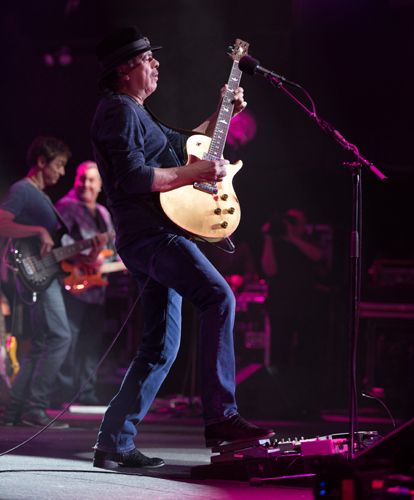
Photo by Billy Heemer
For 50 years, Carlos Santana’s blistering blend of Latin rock has been selling out concert halls and amphitheaters across the globe. Folks pay to listen, they pay to dance, but most of all, they pay to be overwhelmed by the flashy, intense, soul-pounding music that only Santana can play.
On this dreary night just outside the Philadelphia city limits, yet another sold-out crowd got exactly what they paid for. The 11-piece band filed on-stage and Paoli Mejías began the familiar bongo rhythm of “Soul Sacrifice” accompanied by percussionist Karl Perazzo. By the time the rest of the band kicked in, the Tower Theater had erupted into a bellowing roar. Santana’s performance of “Soul Sacrifice” at Woodstock 1969 is one of the defining performances of that immortal weekend, and the footage of that moment played on a big screen behind the band as they rocked – you know, just in case anyone had forgotten.
From there, the band seamlessly moved through “Love Makes The World Go Round” and “Freedom In Your Mind” off Santana’s newest album Santana IV. It was a relentless 20-minute medley that finally came to a halt for Santana to offer his greeting to the packed old theater.
An acoustic guitar was then brought out on a stand for “Maria Maria” off Santana’s 1999 album Supernatural. Santana plucked on some flamenco phrasing in the opening verses sung by vocalists Andy Vargas and Ray Greene, before switching back to his electric guitar for the solos.
After stirring versions of “Evil Ways” and “Jingo” (two more songs from that hallowed Woodstock set), the band slumped down into “A Love Supreme,” the John Coltrane number that Santana covered with John McLaughlin on 1973’s Love Devotion Surrender. Drummer Cindy Blackman Santana, wife to Carlos, brought the volume down to a barely audible swing as Carlos waxed poetic to the crowd.
He explained that the “speed of compassion” is faster than the speed of sound and light, and urged a “faster” society which favors forgiveness over fear. Cindy Blackman snapped the band back into “A Love Supreme,” locking in with bassist Benny Rietveld.
All but Blackman and Rietveld then left the stage for a raucous drum and bass section, which culminated with an extended Blackman drum solo. Her phrasing on the drums is not unlike her husband’s on the guitar: explosive and staccato.
The band then returned for the home stretch, firing off rocking versions of “Black Magic Woman” and “Oye Como Va” before a two-song encore which included the yesteryears pop hit “Smooth” and epic “Toussaint L’Ouverture.”
It’s said that Carlos Santana once told Phish that they were a “hose” and the audience was a bed of flowers. It’s not difficult to see where Santana’s otherworldly sense of connection comes from. When he bends a note, time seems to stand still. He appears frozen, his left hand high on the fretboard while that note hangs suspended in space. Most guitarists work up to that big, high-pitched note. Not Santana – he explodes out of the gates and doesn’t look back. He really means it when he says this music is his way of connecting with the audience on a “molecular level.” Whether or not you are on Santana’s spiritual wavelength, there is something secularly moving about the way he plays his guitar. There always has been and there always will be.


No Comments comments associated with this post